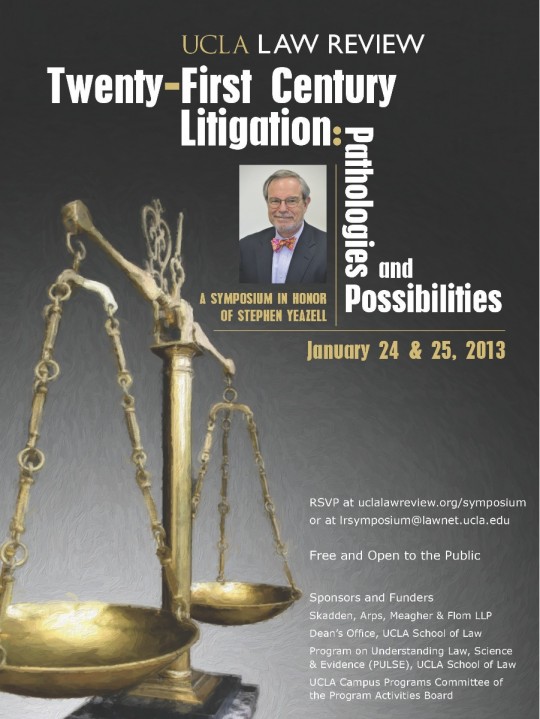Twenty-First Century Litigation: Pathologies and Possibilities
A Symposium in Honor of Stephen Yeazell
Click Here to RSVP
Click Here to RSVP
Thursday, January 24, 2013
1:00 PM Welcome
Dean Rachel Moran, UCLA School of Law
Twombly, Iqbal, and the Future of Pleading 1:30-3:30 pm
The Supreme Court’s recent decisions in Iqbal and Twombly have changed the face of modern pleading. Plaintiffs attempting to bring their claims in federal court must now convince a judge that their allegations are “plausible” – and they must do this prior to any opportunity for discovery. The explicit rationale for these changes was hard to object to: to weed out obviously frivolous litigation and avoid wasting the time of innocent defendants. But the practical effects are significantly more concerning: early evidence suggests the plausibility standard may result in the dismissal of claims for which the incriminating evidence is unavailable to the plaintiff absent discovery. The effect of this catch-22 appears to have especially significant effects on claims requiring proof of intent, including claims of discrimination and retaliation. There may also be significant issues for science-based torts that require significant research or discovery to understand both negligence and causation. This panel will examine how these pleading rules are changing the dynamics of what cases can get a hearing on the merits and the extent to which new pleading rules are achieving their intended goals.
Ben Spencer, Washington & Lee University School of Law
Ron Allen, Northwestern University Law School
Clyde Spillenger, UCLA School of Law
Elizabeth Cabraser, Lieff Cabraser Heimann & Bernstein LLP
Moderator: Laura Gomez, UCLA School of Law
Judging Evidence 3:45-5:45 pm
This panel explores both the procedural rules that structure what evidence gets heard in court, and how judges and other factfinders make sense of the evidence they hear. How and when do procedural rules influence evidentiary determinations? How do the domains’ quite different standards of review – typically abuse of discretion for evidence determinations and de novo for significant procedural resolutions like summary judgment – affect judges’ behavior and litigants’ strategy? To what extent do procedural and evidentiary rules protect judges and fact-finders from cognitive bias and other evaluation errors, and to what extent might their design exacerbate these concerns? More generally, to what degree do these rules, in combination, achieve their intended goals of efficiency and justice?
Jennifer Mnookin, UCLA School of Law
Judge Andrew Wistrich, United States District Court for the Central District of California
Michael Risinger, Seton Hall University School of Law
Barry Cappello, Cappello & Noel LLP
Moderator: Pavel Wonsowicz, UCLA School of Law
Friday, January 25, 2013
From the One to the Many: The Future of Group Litigation 10 am – 12 pm
Professor Stephen Yeazell has long examined the history and structure of group litigation. Yet the structure of group litigation is bound to change given the Supreme Court’s recent decisions in AT&T v. Concepcion (allowing corporations to include class-waivers in arbitration agreements) and WalMart v. Dukes (denying class-certification for a nation-wide class of WalMart employees claiming a policy of gender discrimination). What is the future of group litigation? To what extent can (or should) creative lawyering permit continued development of group claims in the wake of these decisions?
Bill Rubenstein, Harvard Law School
Katherine Stone, UCLA School of Law
Deborah Hensler, Stanford Law School
Alexandra Lahav, University of Connecticut School of Law
Kent Syverud, Washington University School of Law
Moderator: Clyde Spillenger, UCLA School of Law
Lunchtime Talk With Stephen Yeazell 12:30-1:45 pm
The Courthouse Doors: How Much Money Does it Take to Get (and Stay) Inside? 2-4 pm
Professor Yeazell has observed that the changing nature of civil practice has radically transformed the economics of litigation. One hundred years ago, there was minimal expense associated with litigation. Little occurred between the parties’ initial exchange of pleadings and trial. Modern civil litigation is ferociously expensive. Discovery, pretrial motions, class certification, and litigation over experts have all increased the costs of litigation. This panel will examine the economy of civil litigation and its effects on strategy, claims, and litigation finance.
Nora Engstrom, Stanford Law School
Tom Baker, University of Pennsylvania Law School
Ted Eisenberg, Cornell Law School
Jocelyn Larkin, Executive Director, Impact Fund
Moderator: Joanna Schwartz, UCLA School of Law
Evidence and Procedure: The Odd Couple? 4:15 – 5:45 pm
Both evidence and civil procedure provide “frames” for the litigation process, structuring what information is heard and the mechanisms by which the litigation proceeds. They are both “procedural” domains, in this sense – but procedure and substance are, inevitably, inextricably connected. This roundtable explores what evidence scholars and their civil procedure colleagues can learn from each other. This roundtable additionally asks how these procedural domains affect legal substance. How do both evidence and procedure manage problems of uncertainty and imperfect knowledge?
David Sklansky, Berkeley Law
Judge John Wiley, Los Angeles Superior Court
Judge Carolyn Kuhl, Los Angeles Superior Court
Joanna Schwartz, UCLA School of Law
Moderator: Jennifer Mnookin, UCLA School of Law
Concluding Remarks 5:45

